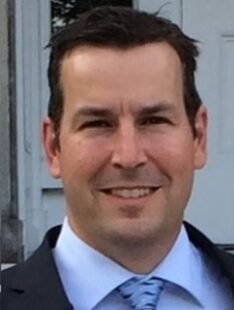Conference Panels
4D-5D for Architecture, Engineering and Construction: Perspectives and Insights
The panel will be moderated by Prof. Conrad Boton and Prof. Silvio Melhado.
Construction Engineering Department, École de technologie supérieure (ÉTS), Quebec University



Dr. Michel Guevremont
M. Sean Boyer
M. Marcus Hashchak
Michel Guévremont is a Senior Lead Engineer at Hydro-Québec since 2010 where he is responsible for the development of 4D simulations and BIM research efforts in powerhouse projects (new facilities and rehabilitations) and transmission substation projects. He has 25 years of engineering and construction experience. He is also Affiliate Assistant Professor at Concordia University with a research interest in 4D simulations. Earlier in his career, he was Project Controls Manager and Lead Scheduler at SNC-Lavalin for 5 years. He worked 5 years in the USA as Claims Avoidance Engineer and Construction Field Engineer with the Kiewit Corporation where he contributed to major projects such as the Big Dig in Boston, Jensen water treatment plant in Los Angeles and the Miami international airport. He holds a PhD in information systems engineering from Concordia University, a bachelor and a master degree from École Polytechnique de Montréal and an executive certificate in innovation and strategy from the Massachusetts Institute of Technology (M.I.T.). He is a registered Professional Engineer in Quebec, a certified Planning and Scheduling Professional with AACEI and a certified Project Management Professional with PMI.
Sean Boyer has been working in the field of construction, specifically in estimation and construction economics, for over 25 years. He holds a bachelor’s degree in construction engineering from the École de technologie supérieure du Québec (ÉTS), and a college diploma in civil engineering technology from the CEGEP of Joliette. He is a member of the Quebec Order of Engineers and the Canadian Institute of Quantity Surveyors (CIQS) as a certified construction economist.
Sean Boyer holds the position of Vice President of Pre-Construction for the Montreal, Quebec, and Ottawa regions at Pomerleau. In his role, he manages the estimation teams, oversees the research and development of various technologies assisted by artificial intelligence related to estimation, is responsible for estimation statistics, and supervises the collection of historical construction cost data.
In recent years, he has become a reference in Canada for tracking inflation in the construction sector by giving conferences on the subject and advising various project owners. He is also the author of the quarterly Market Trends reports produced by Pomerleau.
Marcus Hashchak has been leading the Enterprise Solutions 3D group within the Clean Energy sector at AtkinsRéalis since 2016. His role involves overseeing the use of parametric 3D tools and other digital engineering tools, implementing job-specific solutions, training users, and managing activities related to the development of the BLM/BIM environment.
Marcus has over twenty years of experience in the fields of civil and mechanical engineering. In the past, he has developed processes, automations, designs, mentorship/support programs, best practices, and methodologies specific to the BLM/BIM environment.
Marcus possesses extensive knowledge of various CAD and virtual reality software programs.
Additionally, he actively participates in business development activities for the division and is involved in implementing engineering tools for other sectors at AtkinsRéalis.
This panel will bring together high-level industry professionals and academics to share their diverse perspectives on the practices, benefits, challenges, and issues associated with the use of 4D-5D BIM in the construction industry.
Discussion topics include:
- Use cases and lessons learned:Real-world examples and valuable insights from past experiences with 4D-5D BIM projects.
- Methods and practices for different project and asset types:Exploring various methodologies and their applicability to different types of projects and assets.
- Added value, financial and qualitative benefits:Examining the financial returns and qualitative improvements that the use of 4D-5D offers.
- Learning curve, skills, experience, and training:Understanding the human and educational resources necessary for successful 4D and 5D BIM implementation.
- Contractual issues, responsibilities, budget:Discussing the legal, professional, and financial implications of 4D and 5D BIM adoption.
- Technological Issues, Software, Interoperability:Addressing the technological hurdles, software challenges, and interoperability issues.
Prefabrication or Off-site construction, shedding light on innovative techniques and best practices
The panel will be moderated by Prof. Ivanka Iordanova
Construction Engineering Department, École de technologie supérieure (ÉTS), Quebec University



Roger-Bruno RICHARD
Carlo Carbone
Michèle Tonelli
Roger-Bruno RICHARD is a Master-of-Architecture graduate of the University of California at Berkeley, registered Architect in Quebec, Professor of Architecture at the Université de Montréal and was Director of its School of Architecture for a period of ten years.
Applying the strategies & technologies of industrialisation in order to deliver affordable high-quality architecture and provide adaptability without demolition, he is the author of a four-version “Load-Bearing Service Core” residential building system. His R&D activities also include technological and functional innovations as well as large scale housing projects in North America, Africa and Asia.
The Generic Classification of Industrialised Building Systems he developed is recognised and published at the international level. He was Visiting Researcher at the University of Hong Kong and was granted a JSPS (Japan Society for the Promotion of Science) Research Fellowship at the University of Tokyo.
Carlo Carbone is a professor of Environmental Design at the University of Québec at Montréal Design School (2012-present). A practicing architect in Montréal since 1998, he founded Pre[FABRICA]tions a design research lab in 2010.
The lab’s research is focused on, affordable housing, adaptive reuse of existing buildings, deep energy retrofits, the history of prefabrication, the generative links between industrialization and modern building culture, the prefabrication of houses and the current state of open industrialized building systems, specifically their potential customization by users, builders and architects. A current research-creation project proposes a study and the adaptation of open Core-housing principles as a pattern for promoting affordable housing and building practices.
Michèle Tonelli has been working at Hydro-Quebec for almost 20 years where she has worked in project management, in procurement as well as quality and environmental management.
She holds a degree in mechanical engineering form the Université de Sherbrooke as well as a graduate diploma in Management from McGill University. She is a member of the Quebec Order of Engineers.
In the last 2 years she has worked in developing transformation programmes and initiatives aiming to increase project efficiency as well as integrating the use of technologies in projects.
Earlier in her career, she has worked in manufacturing as well as consulting industries.
The construction industry faces today numerous challenges of social, economic and environmental character.
The need for innovation is obvious and it has already started with several broad strategies like ‘digital transformation’, Lean Construction, integrated practices and industrialized realization methods. Prefabrication, or Off-site Construction (also referred-to as Industrialized Construction) is experiencing a revival in recent years thanks to the use of Building Information Modeling, and because it has the potential to become part of the solution to some of the above-mentioned challenges. Being a systemic innovation, it provokes deep changes in the whole construction ecosystem. This panel will offer the points of view of researchers and industry representatives, highlighting innovative practices, challenges and future trends of development.